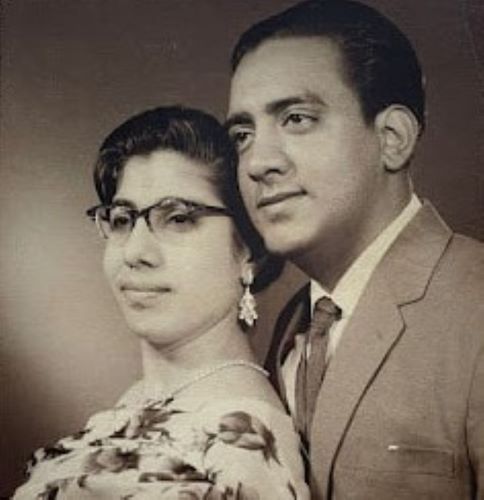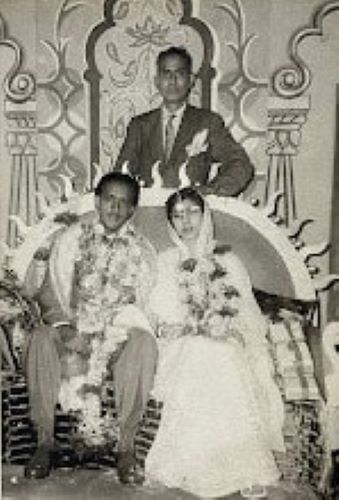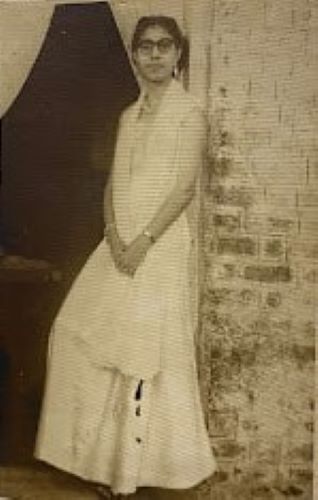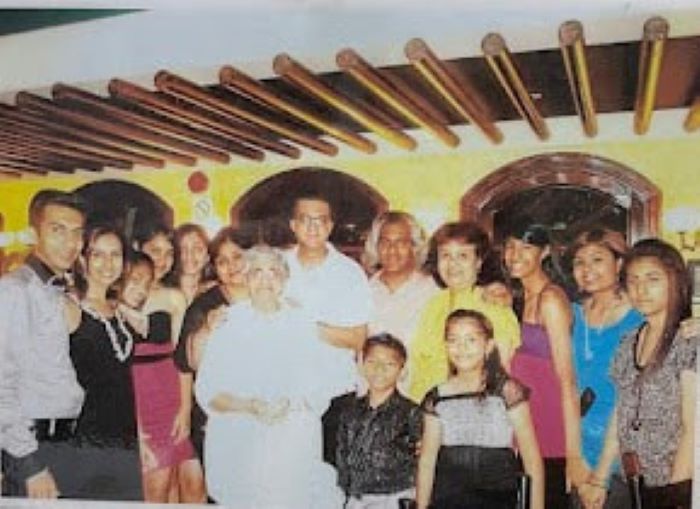
There had been numerous accounts of Hindu girls being abducted and in a family of three daughters, these abductions had left the whole family frightened. These incidents spurred the family to leave Sindh for safer pastures
Partition Stories from the Province of Sindh
Neena Hashumal Nandwani (maiden name: Premi Bhagwandas Wadhwani) was born on 15th July 1932 in Karachi, Sindh, British India.
Following Partition, her family left for India because there were riots and disturbances, and they were becoming more frequent by the day.
Neena currently lives in Singapore and this is her story.
Neena Hashumal Nandwani is the eldest of three sisters and one brother born to Bhagwandas and Rukmini Wadhwani. Her brother was born in 1949, when her family had resettled in post-Partition India.

Neena’s father worked in Manila, the Philippines, and only came back to visit his family once every three years. This was called a ‘Sindhwork’ contract, where Sindhi men were employed by other Sindhis to work in their overseas shops. A contract was typically for three years and they were not allowed to take their wives or families with them. At the time of Partition, Neena’s father was still in Manila and would only be reunited with his family in post-Partition India.
Pre-Partition, Neena and her family stayed with their Nana and Nani (maternal grandparents). Their house was located in a Hindu paro (neighborhood) and Neena recalls that their house was opposite a Hindu temple and a tea shop. Their house was also conveniently located near a market, quirkily named Mitho Dhar (loosely translated as ‘Sweet Door’ or ‘Sweet Gateway / Entrance’). Her neighborhood was mostly made up of Sindhis and it was a well-to-do community.
Neena completed six grades in Sindhi in the Bherumal School, and she used to walk to school. Just before her school was a Gurdwara and on special days, such as Guru Nanak’s birthday, she would go to the Gurdwara to read the Sukhmani Sahib. By the age of 15, Neena had studied at two Sindhi colleges – but all that changed when Partition happened.
Neena was 15 years old when Partition happened.
She recalls constantly hearing noises coming from the sky, but till today, she does not know what it was. Whenever she heard shouting or disturbances, she would step out onto the balcony to see what was happening. Often times, it would be riots. However, she never witnessed them for long as any time she went out onto the balcony, her grandparents would immediately pull her in. There had been numerous accounts of Hindu girls being abducted and in a family of three daughters, these abductions had left the whole family frightened.
They packed their bags, which consisted of steel trunks with clothes and money and left Karachi by the ship called ‘Ekma’ to Bombay

These incidents also spurred the family to leave Sindh for safer pastures. So, they packed their bags, which consisted of steel trunks with clothes and money and left Karachi by the ship called ‘Ekma’ to Bombay (now Mumbai). Neena doesn’t recall much about the journey except that the ship was full and crowded.
Once they reached Bombay, they took an open-aired van to military barracks located in Mulund Colony, which were allocated for the housing of displaced communities. Each family was given a space of their own. Neena recounts the horrible conditions at these barracks, especially so for the women, as the showers were open-aired, and the toilets were a distance away and had no locks on the doors. Neena says that the authorities would dole out chappatis to them as if they were beggars. In Neena’s words, they had seen really ‘takleef’ (tough) days.
The family stayed at the barracks for two years. Neena’s father was finally able to travel to India and join them at the barracks in 1948. Her Nana and Nani, thankfully, were able to move out of the barracks earlier and left for Pune.
Finally, in 1949, things started to settle down. In Mulund Colony, a Sindhi school was opened and Neena was employed as a teacher at this school. Her position as a teacher and her educational background were regarded highly. So, when permanent accommodations were being built in Mulund Colony itself to house the displaced communities, her family was one of the first few to be allocated a house.
For ten years, Neena taught at that school and till this day, when she returns to Bombay, her former students remember and address her as Dadi Premi (‘Dadi’ is a respectful salutation used for older women).

Neena also recounts how she met her husband. Her Mami (maternal aunt) from Pune brought a proposal for her for a relative who was working in Singapore. So, she travelled to Pune to meet her prospective husband. In 1959, Neena got married in Pune.
Following the wedding, her husband returned to Singapore to resume his work at a Sindhi shop called Deluxe but Neena would remain in India and only move to Singapore in October 1963 – when her eldest son was six months old.
One day, her cousin brother who was visiting Singapore, advised her to spend her time fruitfully, in addition to taking care of her family. Taking that advice into account, Neena’s husband got her a shop on rent on Singapore’s famous Orchard Road. The shop sold clothing such as t-shirts and kaftans, and was hugely popular among the British who were living in Singapore. The shop was such a success that her husband came in after 7pm, after he had finished his work, to help out. Their business continued to prosper and they were able to expand the business to offer tailoring services. The shop, Ehkay Corner Tailors, continues to run till this day on Orchard Road.
Today, Neena continues to live in Singapore. She has three sons, who are all married, eight grandchildren and two great grandchildren.
___________________
Courtesy: Stories of Sindh (Posted on 12/19/2021)